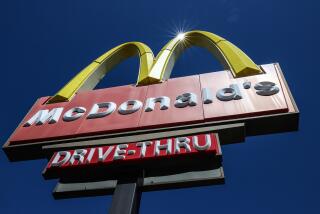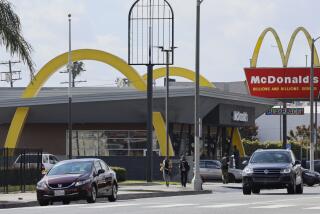Fast-food wars heat up as McDonald’s, Taco Bell and others roll out low-priced items
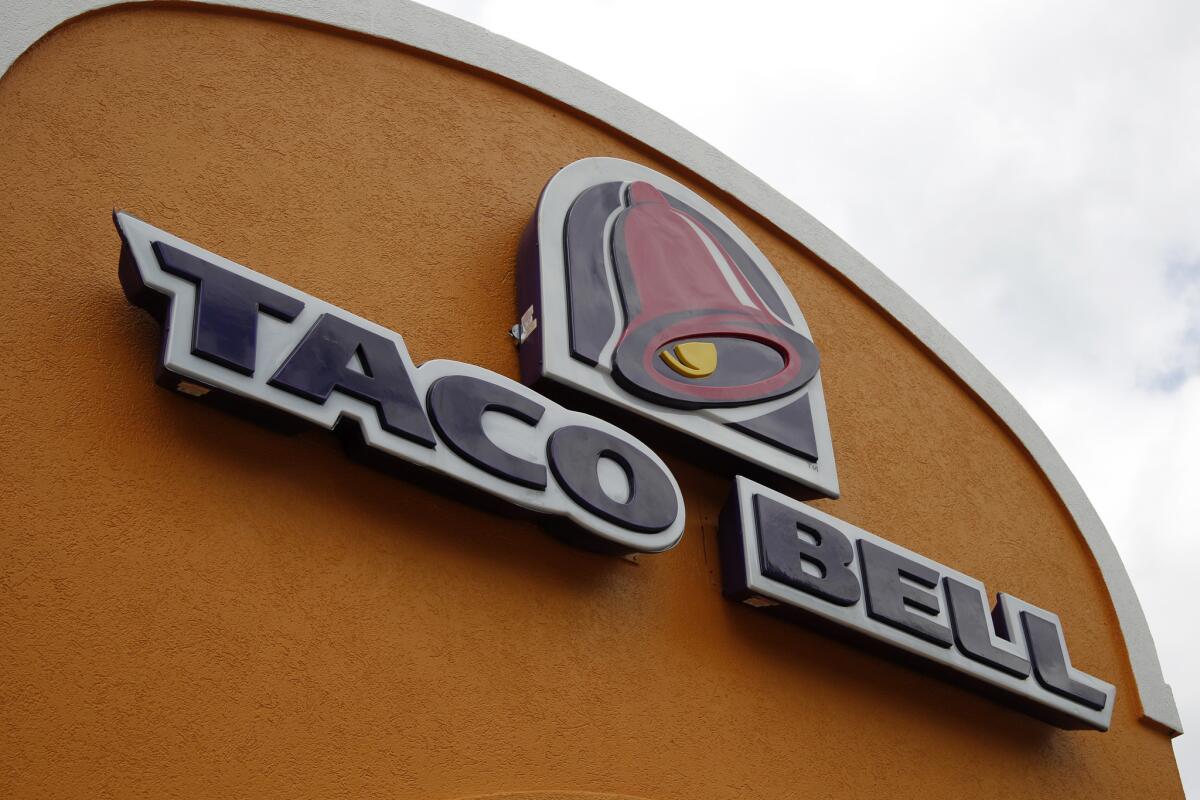
When the McDonald brothers opened their first hamburger stand in 1948 in San Bernardino, they charged 15 cents for a burger. Adjusted for inflation, that would be about $1.54 today.
McDonald’s Corp. — which now serves 25 million U.S. customers a day — is again selling burgers, a McChicken sandwich and certain other fare for less than that adjusted amount.
The fast-food titan last week rolled out a new version of its Dollar Menu, with items priced at $1, $2 and $3, and McDonald’s competitors promptly responded by launching their own low-priced food, creating another chapter in the industry’s so-called value wars.
Taco Bell announced it would sell a new item, Nacho Fries, for $1 starting Jan. 25. Taco Bell, the Irvine-based unit of Yum Brands Inc., said the fries are currently planned as a limited-time offering, one of 20 new $1 items that the chain plans to unveil this year, on top of 20 “mainstay” $1 products it already sells including certain tacos and burritos.
Wendy’s Co. also jumped into the fray, saying it expanded the chain’s “4 for $4” menu to include eight entrees, such as burgers and chicken sandwiches. Each entree comes with chicken nuggets, a small order of French fries and a drink for $4.
Jack in the Box Inc., based in San Diego, launched “Value Done Jack’s Way” with items priced from $1 to $5 to compete in what the chain said will be “a highly contested fast-food value war in 2018.” And Subway has brought back the $5 footlong sandwich, which has riled some franchisees, who say the sandwich costs more than $4 to make.
The spree of low-cost offerings is aimed at helping each chain grab market share from its rivals — or at least protect the share it has — and boosting sales.
Even if there’s little profit, if any, from selling dollar items, “it’s all about getting people in the restaurants,” said R.J. Hottovy, an industry analyst at the investment research firm Morningstar Inc. “Right now it’s a market-share game.”
Another goal: Once customers walk in, they’re apt to buy additional items with higher prices and profit margins. “You go in for the $1 burger but you tack on a beverage or a side dish,” Hottovy said.
Wendy’s, with 261 restaurants in California, earlier tested its expanded “4 for $4” menu in seven cities across the country and “all markets saw increased traffic and profitable sales growth,” said Kurt Kane, Wendy’s chief concept and marketing officer, in an email.
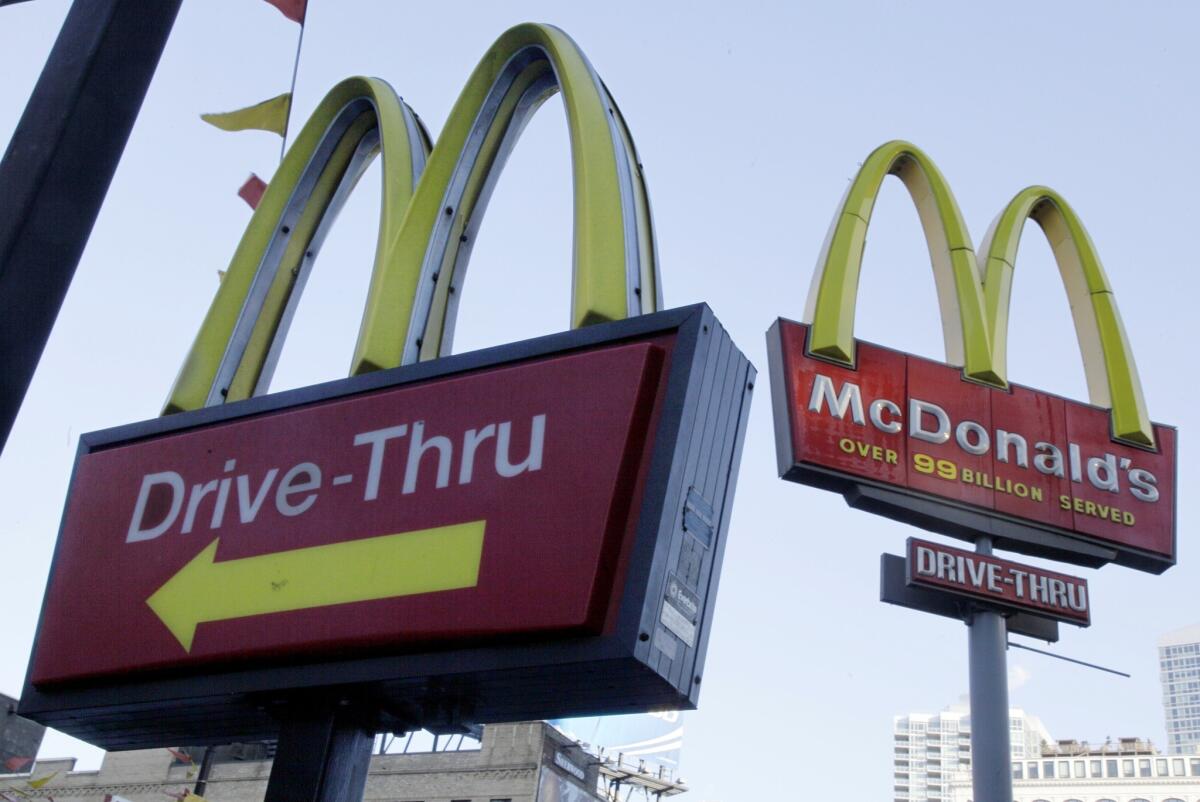
In the case of McDonald’s, the new value menu is needed to reverse customer-traffic declines at its U.S. restaurants that the chain has suffered in recent years since moving away from its original Dollar Menu, some analysts said.
“We believe that this value platform should give traffic back to McDonald’s,” analyst Peter Saleh of the investment firm BTIG said in a note to clients Tuesday, adding that the traffic declines since 2013 amounted to about $2.9 billion in lost sales for McDonald’s.
McDonald’s total revenue last year totaled $24.6 billion, which included sales of company-owned restaurants and revenue from its franchisees, which operate 85% of McDonald’s stores worldwide.
“After several years of playing defense, we believe McDonald’s is finally returning to an offensive strategy,” Saleh said.
While it was expected that competitors would counter McDonald’s move with their own inexpensive foods, “we believe McDonald’s will be a net gainer through all this even as rivals respond,” analyst Mark Kalinowski of the investment firm Instinet said in a note to clients last week.
Kalinowski said McDonald’s was his top stock pick among U.S. restaurants for this year for several reasons, including the new Dollar Menu and McDonald’s plans to roll out more fresh beef in its burgers, including in a new sandwich, the Archburger, that’s currently being tested.
McDonald’s stock already has surged 45% in the last 12 months, and some of the Oak Brook, Ill.-based company’s other financial metrics also have improved. Its U.S. same-store sales, or those of stores open at least a year, rose 4.1% in the third quarter of 2017 from a year earlier, and the company lifted its quarterly dividend by 7%.
Even so, it’s critical that McDonald’s stops the slide in its customer traffic, said Larry Light, who was McDonald’s chief marketing officer in 2002-05 and is now chief executive of Arcature, a marketing consulting firm.
“Fast food is built on volume, it’s like Wal-Mart in the retail business,” Light said. “If transactions go down eventually the business model will collapse. Fast food is not a fine-dining experience, where you can make a big profit on a limited group of customers.”
The issue isn’t that customers have stopped visiting McDonald’s altogether but that they’re visiting less often, “and that’s what McDonald’s has to fix,” Light said.
The new McDonald’s value menu provides various burgers, chicken items, drinks and breakfast foods for $1, $2 or $3, including a $3 Happy Meal, the first time that item has been included in one of McDonald’s national value menus.
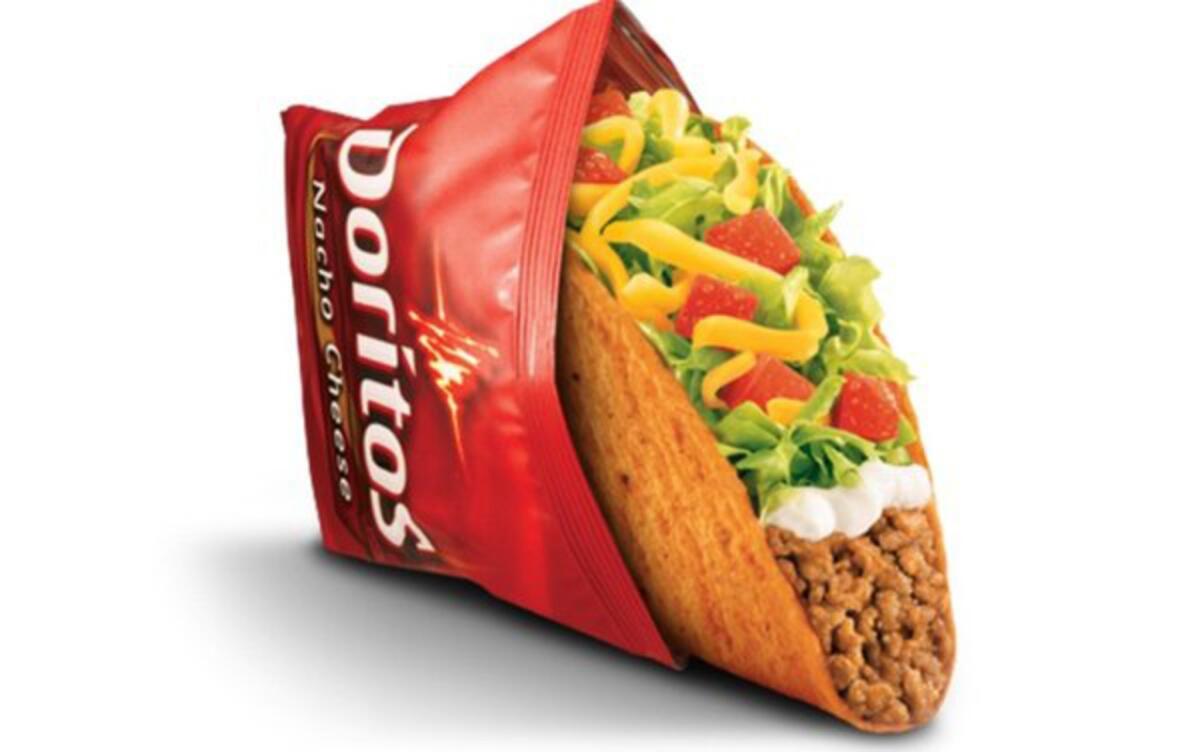
But Taco Bell, Wendy’s and other rivals are on the offensive, too.
Taco Bell, with 845 outlets and 34,000 employees in California alone, asserted that “its $1 offerings reign supreme and always have” regardless of steps taken by McDonald’s and others. Taco Bell had tested its Nacho Fries with customers in Bakersfield and in West Virginia last spring.
Taco Bell’s Irvine test kitchen has a history of inventing innovative food mashups, such as Doritos Locos Tacos, the Quesarito and the Crunchwrap, which made eating a taco while driving less of a death-defying act.
The rush to offer inexpensive food comes as the U.S. economy is showing fairly healthy growth, unemployment and inflation remain relatively low, and the stock market is trading near record highs.
But Hottovy said other factors “are eating away at spending for fast food,” such as sluggish wage growth and rising costs for rent and healthcare. At the same time, “grocery stores have gotten more affordable,” especially at huge discount chains such as Wal-Mart Stores Inc. and Target Corp., he said.
“The consumer is still very value conscious and that’s across all ages,” he said. “Everyone is looking for a deal.”
Twitter: @PeltzLATimes
UPDATES:
1:30 p.m. Friday: This article was updated with additional analysis.
This article was originally published Wednesday at 3:35 p.m.

